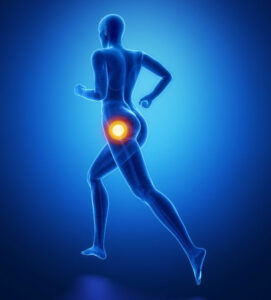The hip is one of the largest and most important joints in the human body. It helps support the body and allows us to walk, kick, swing, and dance. So when it begins to ache it can be frustrating. Pain can present as a dull ache, a burning sensation, or a sharp, intense pain.
Occasional pain is normal and is generally nothing to worry about. Chronic, intense pain is different. This type of pain can affect your quality of life and may be a sign that something else is wrong.
But how do you know the difference between normal soreness and when your hip pain is a cause for concern?
What Causes Hip Pain?
 The hip is a ball-and-socket joint, just like the shoulder. This means that the joint has a greater range of motion than most other joints in the body. But while this allows for greater flexibility, it also makes the joint vulnerable to injury. Injuries from stress, overuse, and improper use are common among people of all ages.
The hip is a ball-and-socket joint, just like the shoulder. This means that the joint has a greater range of motion than most other joints in the body. But while this allows for greater flexibility, it also makes the joint vulnerable to injury. Injuries from stress, overuse, and improper use are common among people of all ages.
As humans, we tend to be rough on our bodies. We lift that piece of furniture that’s a little too heavy, push ourselves too hard at the gym, or forget how old we are when playing basketball with friends. It’s only natural that our bodies fight back. Our bodies use pain to rein us in and remind us not to take it so far next time.
The Consequences of Hip Pain
Aside from injuries, pain can indicate a more serious issue. It can alert us to an underlying disease that requires medical attention. Conditions like osteoarthritis and bursitis can cause wear and tear on the joint. This can lead to severe pain and joint weakness.
If left untreated, these problems can get worse and lead to more severe injuries like fractures from a fall. When pain does not respond to standard treatment protocol including ice, rest, and anti-inflammatories, it may be cause for concern.
It’s not a good idea to ignore the pain. Many times, someone will choose to wait it out to see if it improves or goes away on its own before making an appointment with a doctor.
Waiting may be okay in some circumstances. But ignoring joint pain for too long can increase the likelihood of more significant damage.
An orthopedic surgeon can help you determine the source of your pain before an injury happens. Getting ahead of your pain can improve your quality of life and may prevent more serious injuries.
Let’s take a closer look at some of the consequences of hip pain.
Hip Pain Can Increase Your Risk of a Fall
Falls are the number one cause of injury in older adults. One in four adults aged 65 and older fall each year. According to Health in Aging, arthritis and chronic pain are among the top causes of falls. But how does hip pain increase your risk of a fall?
There are a couple of ways. In some cases, pain can come unexpectedly. It can be so intense that it knocks you over. In other cases, an underlying issue can cause your hips to weaken and give out, resulting in a fall.
Falls can lead to more serious injuries, including fractures. Often, these injuries require long-term care and can cause permanent mobility issues. Recognizing and treating chronic pain can help prevent more serious injuries.
Your Pain May Be a Warning of a More Serious Issue
 Pain is your body’s internal warning sign. It is used to alert you that something is wrong. When there is no apparent injury, it’s especially important to keep an eye on your pain. Hip pain can be a sign of a more serious condition.
Pain is your body’s internal warning sign. It is used to alert you that something is wrong. When there is no apparent injury, it’s especially important to keep an eye on your pain. Hip pain can be a sign of a more serious condition.
As we age, the composition of our bone changes. Bones become more vulnerable to injury and disease, including osteoarthritis. Osteoarthritis is common in adults over the age of 60 but can affect anyone. It occurs when cartilage wears away, causing bone-on-bone contact. This friction can cause extreme pain.
Pain may also be a sign of bursitis. Bursitis happens when the bursae—fluid-filled sacs designed to cushion the body’s joints—become inflamed. The disease generally presents as pain in the outer hip or pain at the front of the hip near the groin.
Your Pain Can Affect Your Ability to Complete Everyday Tasks
People tend to underestimate the effect that pain can have on their quality of life. When you are in pain, simple tasks like walking to the mailbox can be excruciating. In many cases, pain can keep you awake at night and interfere with your ability to get a full night’s sleep.
But more than that, pain can affect your mental well-being, your social life, and your ability to work.
When you’re in pain, you may try to avoid situations that cause it. This may mean skipping social events or calling in sick to work. These alone can have severe consequences, but the act of pulling back can cause social isolation, anxiety, and depression as well.
When Hip Pain is a Cause for Concern
 Unexplained hip pain can have long-lasting and serious consequences. It can affect you both physically and emotionally. In some cases, hip pain may mean that there is something more serious going on.
Unexplained hip pain can have long-lasting and serious consequences. It can affect you both physically and emotionally. In some cases, hip pain may mean that there is something more serious going on.
That’s why it’s always important to talk to a doctor if something doesn’t feel right. A simple consult with an orthopedic surgeon can help to determine the root cause of your pain and may help you reduce or even eliminate it.
At Weis Memorial Hospital, your comfort is our number one priority. Our care team will work with you to discuss your options and find a treatment plan that is right for you.

